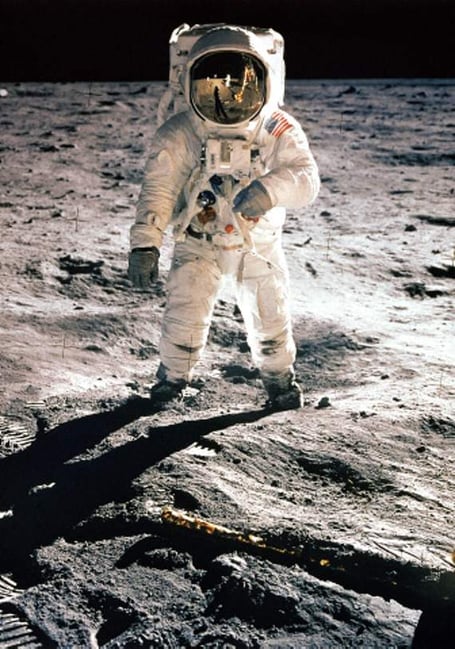FIFTY years ago, Neil Armstrong took ‘one giant leap for mankind’ when he became the first man to step foot on the moon.
July 1969 was an iconic time in history as NASA astronauts Neil Armstrong and Buzz Aldrin landed Apollo 11’s lunar module, Eagle, on the moon. Armstrong was the first man to step foot on the moon, shortly followed by Aldrin.
Launching from Launch Pad 39A at Kennedy’s Space Center in Florida on July 16 of that year, just four days later Armstrong and Aldrin landed Eagle while astronaut Michael Collins orbited the moon in the command module. Since then, there have been six manned US landings between 1969 and 1972 and numerous unmanned landings.
But the first moon landing wasn’t just a huge moment in history for America. It gained attention from across the world — as far as the Post area, where many people were just children when they witnessed the landing on television, listened to broadcasts on the radio and read fascinating articles in newspapers.
Jon Hewlett from Camelford was amongst those who thought the landing was life-changing, and has been interested in space ever since. He said: “I was eleven and my dad woke me up to see Armstrong go down the ladder and take that first step.
“I’ve loved anything spaceflight-related ever since, and it makes me happy to see the growth of commercial space companies. We could be back on the moon soon!”
Meanwhile, Kate Sims admittedly felt a little spooked by the event. She said: “We made up the put-you-up in the lounge where we lived in Croydon and settled down to watch this fantastic event while our two-month-old first born son slept through it all. I was frightened Martians might appear!”
The event was a memorable time for Rod Roberts Ssrh, who said: “I was 12 at the time and followed the Apollo missions from some of the non starters right to the end. Naturally, the most exciting was man’s first steps on the moon — such an exciting memory to have.
“I do have a Saturn V model to this day with the Eagle tucked inside. I’ve always hoped man would be on the moon now and colonies formed, but not to be. I assume Mars will be the next great adventure, but going back to the moon will lay that kind of foundation for further afield space exploration by man and not robots.”
And the moon landing continues to inspire the next generation of space and planet enthusiasts, as is clear in one 23-year-old reader.
He said: “To me, the moon landings were a monumental achievement. The human species is the first from earth to ever step foot on extra-terrestrial soil and try to answer the question, ‘Are we alone in the universe?’ It truly was one giant leap for mankind. To be able to send two men to the moon and bring them home safely in 1969 with the technology available is truly remarkable.
“With the technology available today I believe it won’t be long until we send the first humans to Mars and in doing so have another, greater chance of finding evidence of life in our solar system. As time goes on and technological advancements are made, it won’t be beyond the realms of possibility for human beings to begin to leave our world and settle on others, and it will have all started with the first moon landings back in 1969!”
An exciting venture for Cornwall is Spaceport Cornwall, based in Newquay, which is looking to deliver a ‘horizontal launch Spaceport at Cornwall Airport Newquay, by 2021, creating a satellite technology cluster of national importance’. This is hoped to make space even more explorable in the foreseeable future.
Deputy leader of Cornwall Council, Adam Paynter, said: “The future of the space sector in Cornwall has huge potential. We already have a long history of communications at Goonhilly and Morwenstow. Goonhilly are very active in deep space communications working with many of the space companies globally.
“The average wage levels of people working there is over £40,000, so it will be great to grow this part of the economy.
“Spaceport Cornwall can offer a cheaper and more environmentally friendly way of launching satellites. It is extremely exciting for our young people in Cornwall as they can literally reach for the stars.”
This summer, children will be able to feel inspired by the moon landing 50 years ago with the ‘space chase’ summer reading challenge for 2019, taking place across libraries across the UK and in the Post area, including Camelford, Launceston and Bude libraries.
Camelford Library will hold a space-themed activity morning on September 7 from 10am to 1pm, with registration for the summer reading challenge taking place on Saturday, July 13 from 10am to 1pm.
In Launceston Library, a craft day with DS Smith will take place on Saturday, July 20, which marks the date of the moon landing. On that day, they will make rockets, design astronauts and will also partake in the mascot competition for Cornwall Spaceport, Newquay, which will give children the chance to design a new mascot for the satellite. It is hoped a child from Cornwall will be able to come up with the winning design!
Andy Snook, Launceston librarian, said: “At the end of the summer reading challenge, the children get given a medal and a certificate, so it’s a really brilliant thing to get them doing over the whole summer holiday.”
Launceston Library also plan to run extra Lego building events during the holiday, along with junk modelling and craft days. They are ‘thrilled’ that partners such as Tesco and Barefoot help to make this possible.
On Friday, August 16, Roseland Observatory will visit at 2pm, when people will be able to meet Brian Sheen and hear him explain, using a model rocket over a metre high, how man got to the moon. Children will be able to handle real meteorites and learn about the night sky, planets and stars.
Similarly, children in Bude will also be able to take part in the space chase summer reading challenge, going on an out-of-this world adventure and celebrating the 50th anniversary of the first moon landing.
To sign up, just pop into the library where children will be given a special mission folder to keep a record of their reading. Read at least six library books and collect stickers and rewards along the way, with a medal and certificate awarded to them when they finish.
The start date for the reading challenge is Saturday, July 13 but children are still able to join up after this point, with an end date of Saturday, September 7.
For more information on the challenge, visit https://summerreadingchallenge.org.uk/news/general/about-space-chase.





Comments
This article has no comments yet. Be the first to leave a comment.